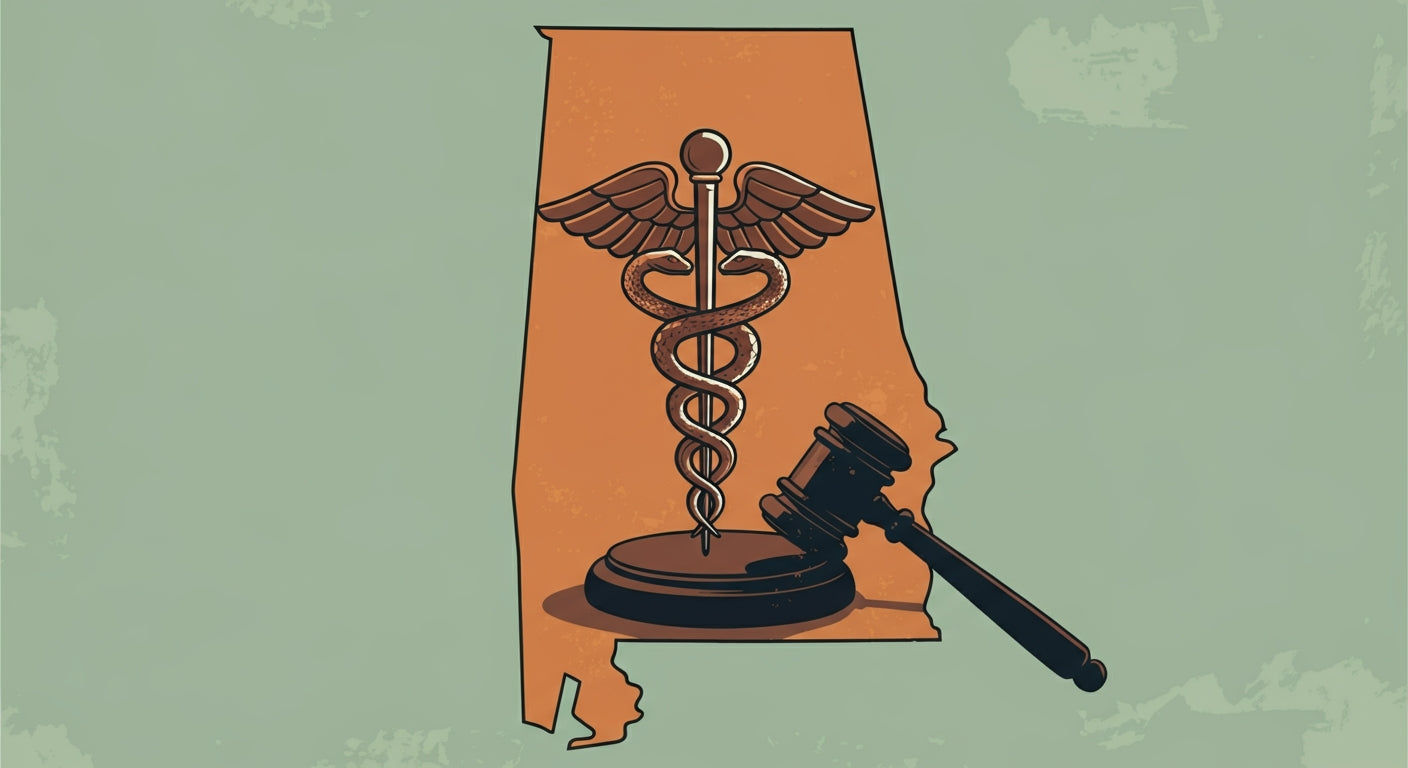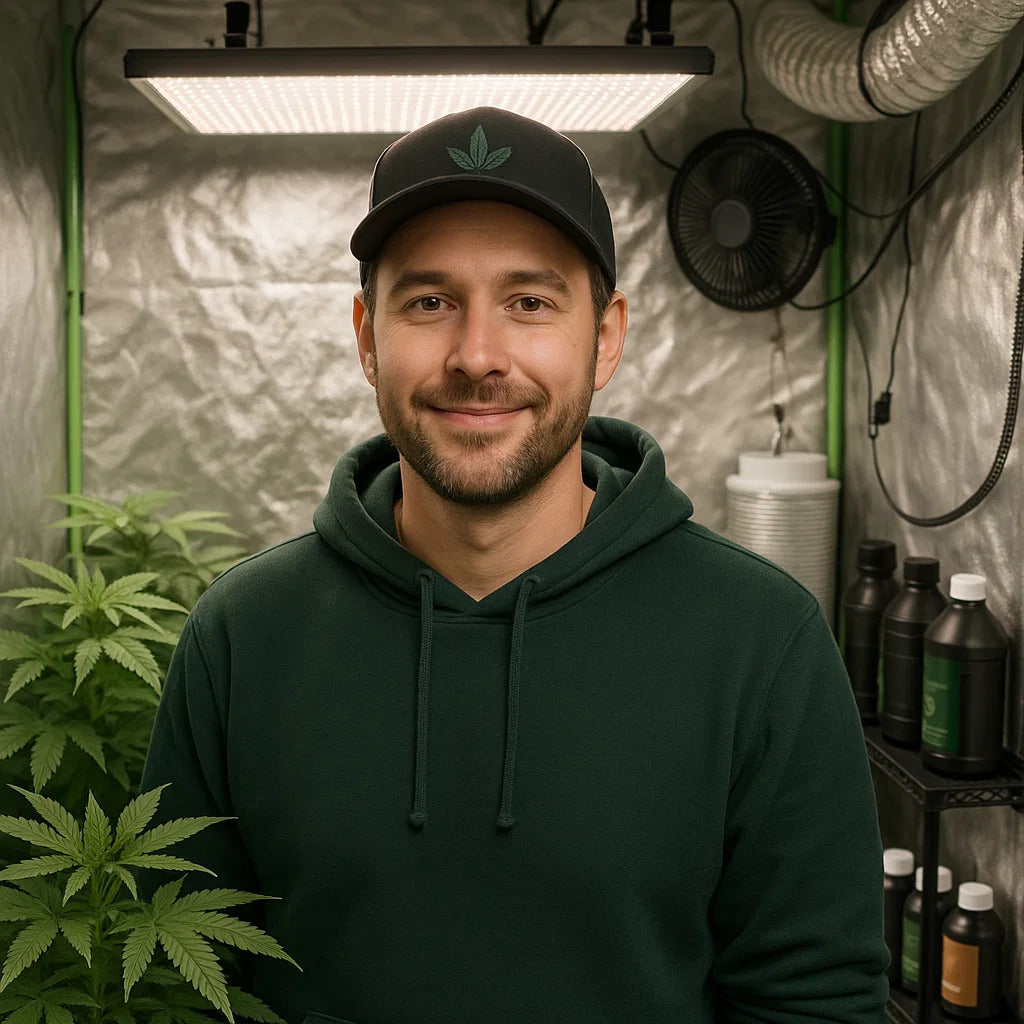
Is Weed Legal in Alabama? Everything You Need to Know About Cannabis Laws in 2025
Medical marijuana is legal in Alabama under the 2021 Compassion Act, but recreational cannabis remains completely illegal. However, the medical program has faced significant delays, and as of 2025, no legal cannabis sales have begun due to ongoing licensing disputes and court challenges. Alabama maintains some of the strictest cannabis penalties in the nation, with even small amounts of recreational marijuana carrying potential jail time and thousands in fines.
The Heart of Dixie passed the Darren Wesley 'Ato' Hall Compassion Act in 2021, creating a framework for medical cannabis access, but implementation has been slower than any other state medical program in U.S. history.

Alabama Cannabis Legal Status: Medical Authorized But Not Available
Alabama's cannabis story is one of legislative progress followed by implementation challenges. Here's the current legal landscape:
What's legal:
- Medical marijuana for qualifying patients (law passed, program not operational)
- Hemp-derived CBD with less than 0.3% THC
- Physician recommendations for future medical cannabis access
What's illegal:
- All recreational cannabis use and possession
- Any unauthorized cannabis cultivation
- Cannabis sales outside the (not yet operational) medical program
- Cannabis flower/smokable forms (even for medical patients)
Timeline of Alabama Cannabis Laws
- 1931: Cannabis prohibited in Alabama
- 2014: Carly's Law - Limited CBD for seizures only
- 2016: Leni's Law - Expanded CBD access slightly
- 2021: Compassion Act passed - Comprehensive medical program authorized
- 2023-2025: Licensing disputes and court challenges delay program launch
- Late 2025: Possible program launch (best-case scenario)
What's Legal in Alabama? Current Cannabis Laws Explained
Medical Cannabis (Authorized But Not Operational)
Alabama's medical cannabis program exists on paper but cannot serve patients due to ongoing legal challenges over licensing. When operational, the program will allow:
Qualifying patients (19+ years old):
- Possession of up to 70 daily dosages of medical cannabis
- Access to specific product forms only (tablets, tinctures, patches, oils, gummies)
- Purchase from licensed dispensaries (when available)
- Registration through Alabama Medical Cannabis Commission
Qualifying conditions include:
- Cancer and cancer-related cachexia
- Epilepsy and seizure disorders
- Autism spectrum disorder
- Chronic pain (after conventional treatments fail)
- PTSD
- Persistent nausea
- HIV/AIDS
- Parkinson's disease
- Multiple sclerosis
- Sickle cell disease
- Tourette's syndrome
- Crohn's disease
Restricted product forms:
- Allowed: Tablets, capsules, tinctures, gel cubes, topical gels/oils/creams, suppositories, transdermal patches, nebulizers, inhaler liquids/oils
- Prohibited: Smokable flower, edibles, raw plant material, concentrates/hash

Recreational Cannabis: Completely Illegal
Alabama maintains complete prohibition on recreational cannabis with some of the harshest penalties in the United States.
Current penalties:
- Any amount (first offense): Up to 1 year jail, up to $6,000 fine
- Any amount (repeat offense): 1-5 years prison, up to $7,500 fine
- Possession with intent to distribute: 1-10 years prison, up to $15,000 fine
- Cultivation: Class B felony, 2-20 years prison, up to $30,000 fine
- Sale to adults: 2-20 years prison, up to $30,000 fine
- Sale to minors: 10 years to life imprisonment, up to $60,000 fine
Additional consequences:
- 6-month driver's license suspension for marijuana convictions
- Permanent criminal record affecting employment and housing
- Mandatory minimum sentences that judges cannot reduce
Why Alabama's Medical Program Remains Delayed
Alabama's medical cannabis program has faced unprecedented delays due to licensing controversies and legal challenges:
Licensing Disputes
The Alabama Medical Cannabis Commission (AMCC) has attempted multiple times to award licenses since 2023:
Timeline of setbacks:
- June 2023: First licenses awarded, then immediately rescinded
- December 2023: New scoring and licensing attempt
- 2024: Multiple court challenges and stays imposed
- 2025: Some licenses awarded, but legal challenges continue
Current status:
- Some cultivation and processing licenses awarded
- Dispensary licenses still disputed
- No patient registry operational
- Court cases blocking program launch
Why the Delays Matter
Unlike most medical cannabis states, Alabama provides no legal protections for patients while the program remains non-operational. This means:
- Qualified patients cannot legally possess cannabis
- No temporary access provisions
- Patients risk criminal prosecution for self-medication
- No timeline guarantee for program launch
Home Cultivation: Completely Prohibited
Alabama is one of the few medical cannabis states that prohibits all home cultivation, even for registered patients.
Cultivation penalties:
- Any number of plants: Class B felony
- Prison sentence: 2-20 years mandatory minimum
- Fines: Up to $30,000
- Additional charges: May include trafficking based on plant count
Why No Home Growing?
Alabama's Compassion Act specifically prohibits home cultivation to:
- Maintain strict state control over supply
- Prevent diversion to illegal markets
- Ensure product testing and quality control
- Limit program to licensed commercial operations only
Future Indoor Growing Considerations
Once Alabama's medical program becomes operational, patients will rely entirely on licensed dispensaries. However, many patients in other states supplement dispensary purchases with professional indoor growing equipment for legal cultivation.
For Alabama residents considering future possibilities or those moving to legal states, understanding quality growing equipment is valuable:
Professional growing solutions:
- Complete grow tent kits for controlled environments
- LED grow light systems for optimal plant development
- Advanced nutrient solutions for medical-grade cannabis
Note: These products are only legal for cannabis cultivation in states where home growing is permitted. Alabama patients must wait for dispensary access.
Alabama's Dispensary Network (When Operational)
Alabama plans a limited dispensary network compared to other medical states:
Planned infrastructure:
- Up to 37 dispensaries statewide initially
- Additional locations possible after one year of operation
- Regional distribution ensuring access across all areas
- Integrated operations (same companies handle cultivation, processing, and retail)
Expected locations include:
- Birmingham metro area
- Montgomery
- Mobile
- Huntsville
- Tuscaloosa
- Auburn/Opelika
- Rural counties as required by law
Penalties for Cannabis Violations in Alabama
Alabama maintains some of the nation's strictest cannabis penalties, including mandatory minimum sentences that judges cannot reduce.
Possession Penalties
Personal use (any amount):
- First offense: Misdemeanor, up to 1 year jail, up to $6,000 fine
- Second offense: Class C felony, 1-10 years prison (mandatory minimum 1 year 1 day), up to $15,000 fine
Intent to distribute:
- Any amount: Class C felony, 1-10 years prison, up to $15,000 fine
Sale and Distribution Penalties
Sales penalties:
- Any amount to adults: Class B felony, 2-20 years prison, up to $30,000 fine
- Sales to minors: Class A felony, 10 years to life imprisonment, up to $60,000 fine
- Near schools: Additional 5 years imprisonment
Trafficking Penalties
Large-scale operations:
- 2.2-100 pounds: Mandatory minimum 3 years, possible 10-99 years, up to $25,000 fine
- 100+ pounds: Enhanced trafficking charges with life sentences possible
Failed Reform Efforts in Alabama
Despite growing national acceptance of cannabis reform, Alabama has consistently rejected liberalization efforts:
Recent Failed Bills
Senate Bill 160 (2022):
- Would have decriminalized possession under 2 ounces
- Reduced fines from $6,000 to $250
- Allowed expungement of minor possession offenses
- Status: Postponed indefinitely in committee
Various decriminalization bills (2019-2024):
- Multiple attempts to reduce penalties
- Bills to allow constitutional amendment votes
- All failed in committee or floor votes
Why Reform Fails in Alabama
Several factors contribute to Alabama's resistance to cannabis reform:
- Conservative legislature opposed to liberalization
- Law enforcement opposition to any relaxation of penalties
- Religious and cultural opposition in conservative communities
- Lack of strong advocacy organizations compared to other states
- Focus on medical program rather than broader reform
Federal vs. State Law Implications
Alabama's situation highlights the complexity of cannabis law:
Federal prohibition means:
- Cannabis remains illegal under federal law in all states
- Federal agencies can still prosecute in Alabama
- Banking and financial services remain limited
- Interstate transport prohibited
- Federal employment restrictions apply
State medical authorization provides:
- Protection from state prosecution (when program operational)
- Regulated access to tested products
- Medical oversight and dosing guidance
- Legal framework for patients and businesses
Driving and Cannabis in Alabama
Alabama maintains zero tolerance for cannabis and driving:
DUI laws:
- Any detectable THC can result in DUI charges
- No legal limit established (unlike alcohol)
- Penalties same as alcohol DUI
- License suspension and criminal charges
Safe practices:
- Never drive after any cannabis use
- Understand that medical use (when available) doesn't allow impaired driving
- THC can be detected days or weeks after use
- Always use alternative transportation
What's Next for Alabama Cannabis?
Several factors could influence Alabama's cannabis future:
Potential Program Launch (2025-2026)
Optimistic timeline:
- Licensing disputes resolved in 2025
- First dispensaries open late 2025 or early 2026
- Patient registry begins accepting applications
- Limited product availability initially
Challenges remaining:
- Ongoing court cases
- Limited licensed operators
- Restrictive product forms
- High costs expected due to limited competition
Future Reform Possibilities
Potential catalysts for change:
- Federal rescheduling or legalization
- Surrounding state legalization creating pressure
- Medical program success demonstrating safety
- Growing public support for reform
- Economic benefits in neighboring states
Frequently Asked Questions
Is recreational weed legal in Alabama?
No, recreational cannabis is completely illegal in Alabama as of 2025. Possession of any amount can result in up to one year in jail and $6,000 in fines for first-time offenders, with harsher penalties for repeat offenses.
Is medical marijuana legal in Alabama?
Yes, medical marijuana is legally authorized under Alabama's 2021 Compassion Act, but the program is not yet operational due to ongoing licensing disputes and court challenges. No patients can legally access cannabis yet.
Can you grow weed at home in Alabama?
No, all cannabis cultivation is illegal in Alabama, including for medical patients. Growing any number of plants is a Class B felony punishable by 2-20 years in prison and fines up to $30,000.
When will Alabama dispensaries open?
Alabama officials hope dispensaries could open by late 2025 at the earliest, but ongoing legal challenges make this timeline uncertain. The program cannot launch until licensing disputes are resolved.
What are the penalties for weed in Alabama?
Alabama has some of the harshest cannabis penalties in the U.S. First-time possession of any amount is punishable by up to 1 year in jail and $6,000 in fines. Second offenses become felonies with mandatory minimum prison sentences.
Summary: Alabama Cannabis Laws Made Simple
Alabama has authorized medical marijuana but the program remains non-operational due to legal challenges, while recreational cannabis remains completely illegal with severe penalties. Medical patients must wait for licensing disputes to resolve before gaining legal access to non-smokable cannabis products only. Alabama maintains some of the nation's strictest cannabis laws, with mandatory jail time and substantial fines for any unauthorized possession.
Planning for the future of cannabis cultivation? While Alabama prohibits all home growing, residents moving to legal states or planning for potential future reforms can research professional cultivation equipment like grow tent systems and advanced growing technology. Understanding quality cultivation methods prepares patients for legal access when and where it becomes available.
Alabama's cannabis journey remains one of the most challenging in the nation, with patients caught between legal authorization and practical prohibition.

Lena Myles
I'm a mushroom enthusiast and home cook based in Oregon. I'm passionate about foraging and creating fungi-focused recipes, especially delicious, plant-based dishes using gourmet mushrooms like trumpet, shiitake, and oyster. When I’m not in the kitchen, you’ll usually find me wandering the woods in search of new wild flavors.


